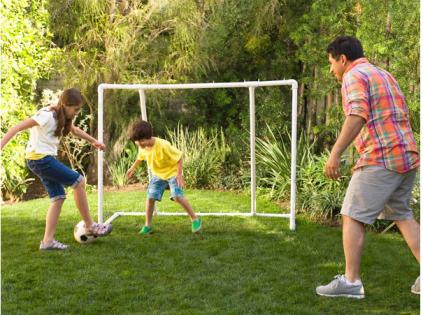Studies that review the developmental history of many great athletes have demonstrated the importance of what is known as 'deliberate play' during the developmental years.
According to a 2008 Oxford University study: “The most skillful team sport players have been found to differ reliably even from other team-mates playing at an elite level in terms of the amount of unstructured practice they have taken during their developing years.”
What is ‘deliberate play’?
Deliberate play is play that consists of those activities, such as ‘backyard/street matches’, undertaken in situations that encourage improvisation and role-playing rather than pure repetition and where the principle emphasis is on fun rather than skill improvement.
An example
The best way to understand deliberate play is to look at a few examples.
Let’s imagine a game of football in a narrow alley way with tall buildings lining the sides, in which six young neighbours are playing a game of football. They have set some goals with some drink cans and broken in to two sides of three. The kids make up their rules which allows for deflections off the buildings and away they go.
There is so much that the kids playing will learn without even knowing it, otherwise known as learning implicitly. For example, because they are in a narrow alleyway, they won’t be able to use space or go around the outside to beat their opposition. They will learn how go through the opposition by quick passing in a small space, or how to beat their opposition in a small space with deception and ball skills.
Another example
Another example of deliberate play might be three friends playing half court basketball in a driveway after school.
They decide that the offender, or the one with the ball, has to play against the other two defending. The offender then will be learning how to beat the opposition if he is double-teamed. This may be done by tricks when dribbling, faking shots or simply very quick movement. Or maybe the kids decide that two offenders play against one defender. The defender in this case is then having to learn how to apply more of a zone defence rather than just marking one person.
Once again, the kids won’t be aware of what they are learning. All they know is that they are playing and having fun.
How is deliberate play different from deliberate practice?
It is important to understand the concept of deliberate play with reference to deliberate practice. According to Geoff Colvin in his bestselling book, Talent is Overrated:
"Deliberate Practice is practice that is designed specifically to improve performance that is repeated with high repetition in which there is continuous feedback. It is highly demanding mentally and is often not much fun."
It is commonly recognised that deliberate practice becomes more important later in the development of sports expertise.
Why is deliberate play so important?
Deliberate play provides the necessary repetition of open play situations that develop game sense, anticipation, the ability to recognise patterns and improvisation skills. These qualities are the key determinants that most often separate expert performers from the pack.
If parents or coaches understand the concept of deliberate play and its importance, particularly during early developmental stages – under the age of 13 - they can simply encourage it to take place by simply providing opportunities for kids.
These opportunities may be in the form of the examples above or simply mum or dad organising kids spending time with friends in a park with equipment, playing beach cricket with the family.
You can check out a number of deliberate play activities at SkillforKids.com. It includes Apps for 0-2 years, 2-4 years and 4-6 years.








 Agree (0)
Agree (0) Disagree (
Disagree (











__small.png)










